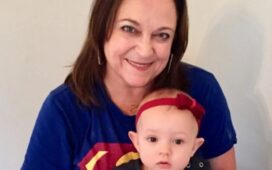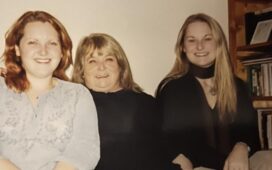It was 10 June 2015. The sun was shining, the birds were singing, and Maisie, our cherished baby, was making her way into the world. At 7.14pm, Maisie made her appearance. A mop of thick black hair, a cute button nose and chubby little fingers that curled lovingly around my hand.
This is it, I thought. I’m head over heels in love.
But within hours, we heard the words no parent wants to hear: “There’s something wrong with your baby’s heart.”
In the blink of an eye, our world came crashing down. How could this be? Why didn’t we know? Why us?
“We’re afraid it’s very serious,” the doctors said. “She only has half a heart. And if we don’t operate tomorrow, she won’t make it.”
The hospital became our home – distastefully decorated with wires, luminous lights and shrill sounding electronics. We survived on a bitter cocktail of adrenaline and caffeine, sleeping only when we collapsed with exhaustion.
Suddenly, the thought of bickering over the colour of the nursery or when I’d go back to work seemed utterly irrelevant. Now, we were only worrying about two things: life and death.
Despite the odds, nearly six months later we finally got to take her home. “I didn’t think you’d get out of here,” a nurse told us candidly. “Neither did we,” we thought. And that was it – off we went, packed up with a sick baby, a car full of oxygen and a mezze of medicines.
We had a peculiar and medicalised initiation into parenthood. Instead of worrying about milestones and feeding, we wondered whether our baby would be with us in the morning and what her future held.
Shared experience offers a sense of cohesion and is part of the reason why new mother and baby groups are so popular. You’re in it together, riding the crazy wave of parenthood.
Friendships, social cohesion and community are crucial to meet our psychological needs. When we have people we can talk to, and feel like we belong, this helps us feel less isolated. This isn’t just true for parents, but for our children too. So, when your family’s journey is poles apart from your peers’, it’s easy to see what can happen.
Parenting a child with complex needs is one of the most rewarding experiences known. You learn to live in the moment, take pleasure in the small things and be grateful for today. But there’s no denying that it’s an experience fraught with complex emotions. Denial, fear, helplessness, guilt and confusion are just a few. But arguably one of the most prominent emotions you can encounter is loneliness.

According to research from Carers UK and the Jo Cox Commission on Loneliness, nine in 10 unpaid carers of disabled children have felt lonely or socially isolated. And for many, the burden of having to put on a brave face and say everything is OK is tiring; it drags you down and is hard work.
Inevitably, these feelings have been heightened by the coronavirus pandemic, which shows no regard for personal circumstance and fills us all with fear.
There are nearly 14 million disabled people in the UK and 8% of children are disabled. But as I discovered when Maisie was small, one of the key challenges is finding people in similar situations nearby, as well as the services you need, in one easy, accessible place.
Our own family experience of disability and isolation led me to spend the past 14 months working on a “tech for good” solution to these problems.
Friendili is an iOS and Android app that aims to revolutionise how families facing health and disability challenges can find new friends, exchange support and interact. It uses algorithms to match members on different criteria, such as location, age of child, interests and their child’s diagnoses – from autism and ADHD to rare disease and more.
Parents can also have meaningful conversations on topics that matter to them.
Belonging to a network of people who understand the challenges you face is priceless. It is only when we start talking to others in a similar situation that we find the support, strength and encouragement to get through it.













